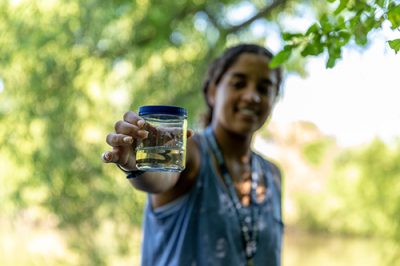
Three high school students from across the country are getting hands-on experience of classical and cutting-edge microbiology techniques during a three-week program at UConn. JuHwan from South Carolina, Sarida from Texas, and Tiffany from California are working in the lab of microbiology professor Joerg Graf.
They are among 59 students taking part in the Jack Kent Cooke’s Young Scholars program July 7-27, a national scholarship initiative for students in 8th through 12th grade who demonstrate exceptional academic abilities, unique talents, and persistence.
Modeled after the Neag School of Education’s Mentor Connection program – which was developed at the Renzulli Center for Creativity, Gifted Education, and Talent Development and hosted at UConn for 20 years – the Young Scholars Senior Summit at UConn is based on research evidence demonstrating the importance of mentors in high-end talent development.
Accomplished UConn professors and/or advanced graduate students host participants in their labs and studios and work with them on projects in shared areas of interest, emphasizing hands-on research and creative productivity.
Cho, Morejon, and Yuen are working on a project to isolate bacteria from the GI tract of leeches, specifically, bacteria from the genus Aeromonas. During their three weeks on campus, the students will isolate the bacteria, perform biochemical tests on them, and sequence their genomes. Using the genome sequences, they will look for genes that encode proteins needed for bacterial motility, as well as genes that encode a type six secretion system (T6SS), which bacteria often use to attack and kill other bacteria. Once they determine whether the bacteria have these genes, they will make predictions on whether or not they will be motile and may be able to kill ‘prey’ bacteria. In the last week of the project, they will perform assays with the bacteria they isolated to test their predictions.
One of their first tasks was to capture some leeches from a local pond to use in the lab.
Editor’s note: this article originally appeared in UConn Today.
 Facebook
Facebook
 Twitter
Twitter
 LinkedIn
LinkedIn
